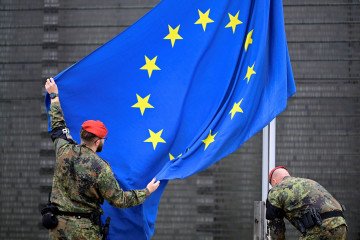- Category
- World
Why Are Russian Churches Appearing Near Europe’s Military Bases?
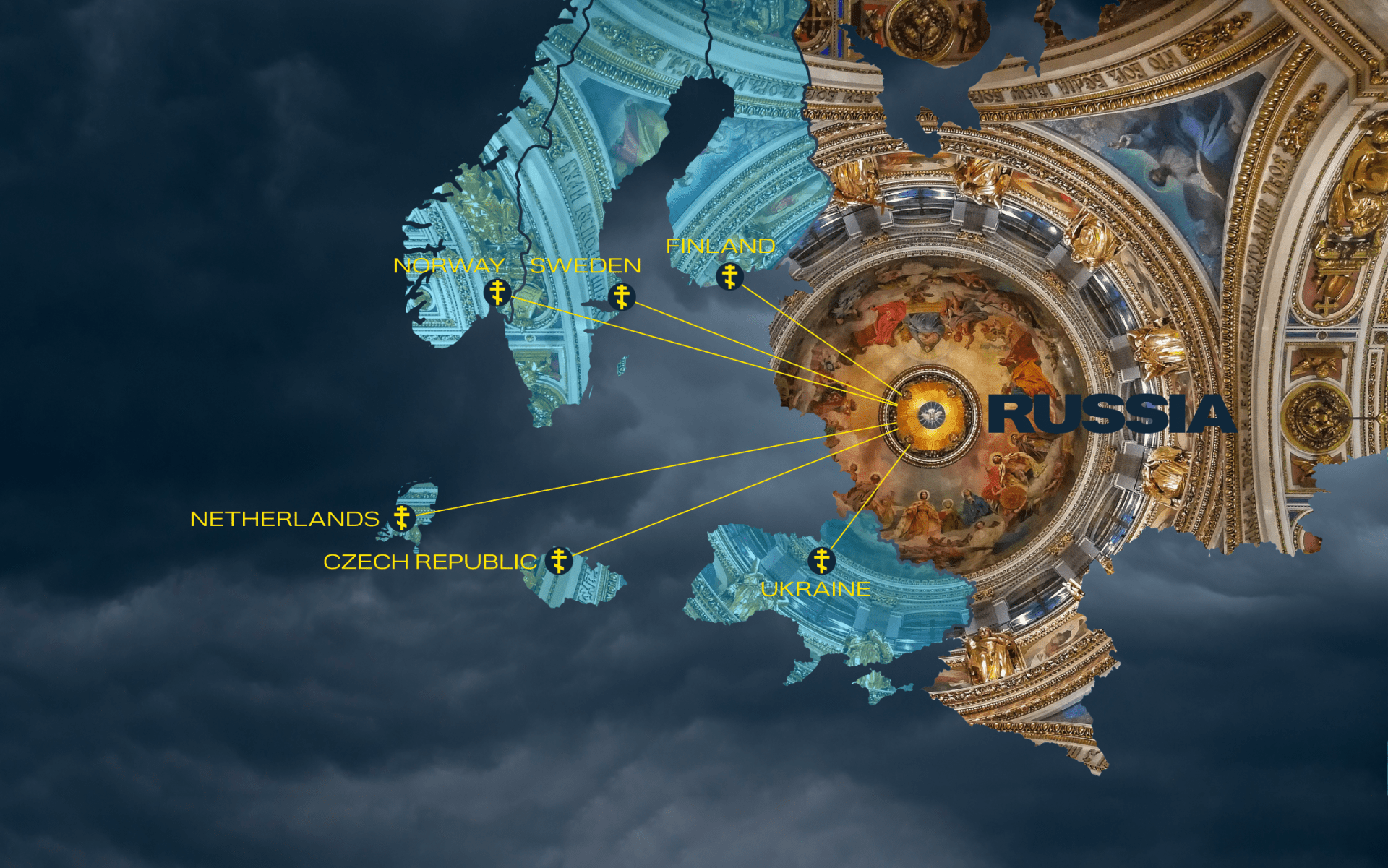
Under the guise of religion, Moscow has created a spy and propaganda network across Ukraine and Europe, spreading pro-Russian influence, anti-Ukraine sentiment, and pro-war rhetoric—another tool in the Kremlin’s hybrid warfare arsenal.
The Kremlin has been found to actively use the Russian Orthodox Church, known as Moscow Patriarchate (ROC / ROC-MP) to employ religious propaganda and to justify Russia’s full-scale invasion of Ukraine.
While Ukraine’s Security Service (SBU) prosecutes church abbots and priests who pose a security threat, investigations have found the ROC to “systematically” construct churches near government institutions and military bases across Europe, posing as what researchers say potential intelligence-gathering channels.
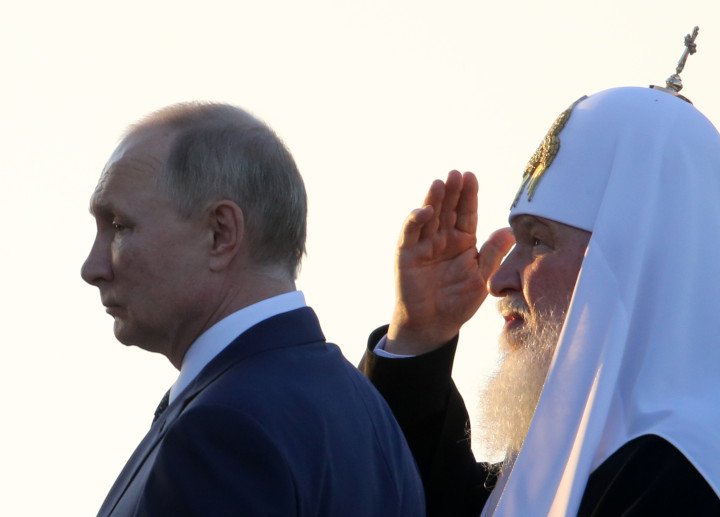
Inside Russia’s Orthodox Church
The Russian Orthodox Church has created its own branch in Ukraine—the Ukrainian Orthodox Church of the Moscow Patriarchate (UOC-MP or UOC). As the UOC is subordinate to the ROC, it should not be mistaken for the autonomous Orthodox Church of Ukraine (OCU).
In January 2019, the OCU received a decree of autocephaly, from the Patriarch of Constantinople, legitimizing the fully independent national church in Ukraine. This move was referred to as “monumental” not just for religion “but the wider geopolitical implication for Ukraine’s national security.”
The ROC and its close ties to the Kremlin are no secret. The ROC Head Vladimir Gundyaev, now known as Patriarch Kirill, a former KGB officer, is a staunch supporter of Russian leader Vladimir Putin, previously comparing Putins reign as a “miracle of God.”
Kirill has been banned from entering Ukraine since 2014 due to his Moscow ties and since 2023, has been placed on Ukraine’s wanted list, charged with “encroachment on the territorial integrity and inviolability of Ukraine” and “waging a war of aggression.”
In January 2023 Kirill denounced the Ukrainian government and said that the ROC would be triumphant in Ukraine, “there will be no trace left of the schismatics because they are fulfilling the devil’s evil bidding of eroding Orthodoxy on Kyivan land.”
Kirill’s comments regarding Russia’s full-scale invasion over the years have caused widespread criticism. In 2022, Pope Francis warned Kirill to avoid becoming “Putin's alter boy”, – but the Pope's forewarnings hadn’t deterred Kirill of deepening the ROC’s relationship with Moscow, his openly Orthodox Church of Ukraine and pro-war rhetoric.
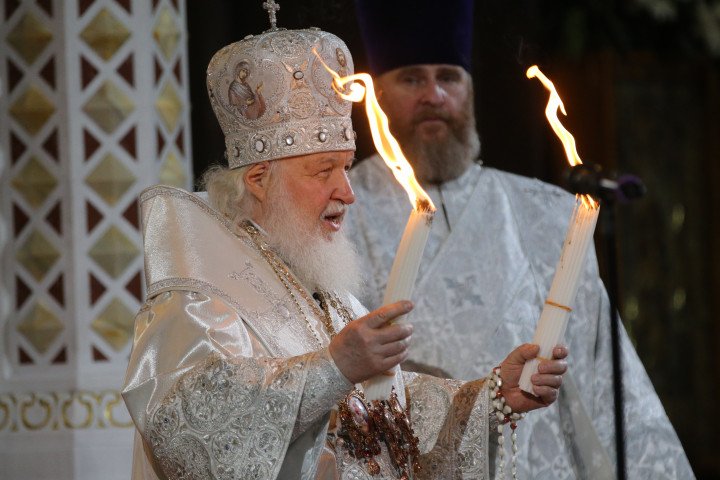
Russia’s illegal invasion of Ukraine—a “Holy War”
The ROC adopted an ideological policy document “The Present and Future of the Russian World” at the World Russian People’s Council on March 27, 2024, declaring Russia’s invasion of Ukraine as a “holy war” (Svyashennaya Voyna), accusing Ukraine and the West with having “fallen into Satanism.”
The goals outlined within the decree are clear, to destroy Ukrainian sovereignty and statehood, and after Russia’s invasion of Ukraine has ended, to assert sole authority over Ukraine and implement the “Russian world” (russkiy mir). “The entire territory of modern Ukraine must enter the zone of exclusive influence of Russia”, the document states.
“By defining the invasion in explicitly spiritual terms, the Russian Orthodox Church hopes to whitewash the war crimes being committed in Ukraine and encourage more ordinary Russians to volunteer,” Brian Mefford, a senior fellow at the Atlantic Council, stated.
The decree called Russian-occupied regions of eastern Ukraine “lands of South-West Rus” and said that Russians have “the right to live on their own land within the borders of a single Russian state”—in line with Moscow’s rhetoric that Ukrainian land, belongs to Russia.
The ROC “term ‘holy war’ may conjure allusions to the Great Patriotic War (World War II), as the Soviet Union’s unofficial war anthem shares the same name,” Institute for the Study of War (ISW) highlighted. “The Kremlin has routinely invoked the mythos of the Great Patriotic War to generate domestic support for the war in Ukraine.”
It is now apparent that he (Putin) views the war as a sacred mission and will not stop until Ukraine has been wiped off the map of Europe.
Brian Mefford
Senior fellow at the Atlantic Council
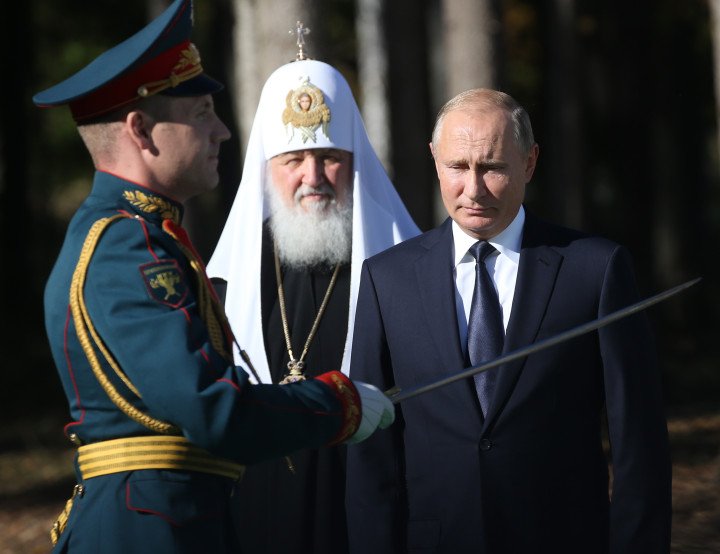
Russian Orthodox Church spies in Ukraine
The Russian spy-monks in the Kyiv-Pechersk Lavra monastery of Ukrainian Orthodox Church have been accused of having links to Russia. The abbot of the monastery was placed under house arrest for 60 days with an electronic bracelet.
— Yasmina (@yasminalombaert) April 1, 2023
Earlier today, the Security Service of Ukraine,… pic.twitter.com/zqBu1RsK0i
Kyiv
Metropolitan Pavel Lebed ran the Kyiv-Pechersk Lavra, Ukraine's most important monastery. Part of the UOC, his church was loyal to Moscow. In April 2023, SBU charged Pavel with “inciting religious hatred, justifying and denying Russia's armed aggression against Ukraine.”
“Songs praising the ‘Russian world’ were sung” in his monastery, SBU reported. They intercepted his phone and heard him describing Russia's invasion as provoked by Ukraine, and as a "war between the Russian Federation and America until the last Ukrainian is killed.”
Speaking about the Russian occupation of Kherson, last year reports claim that he said "there are already Russian flags everywhere and people are happy.”
For the first time, Pecherska Lavra in Kyiv is hosting a Ukrainian Orthodox service on Christmas. Carols rang out in the golden hall, the Ukrainian language echoing out through the church. pic.twitter.com/Kd2jIWrjk0
— Megan Specia (@meganspecia) January 7, 2023
Siverskodonetsk
Andriy Pavlenko, an Orthodox church abbot of the UOC in Siverskodonetsk Luhansk region, seemed to be supporting Ukraine in their fight against the Russian invasion by visiting injured soldiers and praying for them. Though, behind closed doors, according to court records, he was working as a collaborator with Russian forces.
“In the north, there are about 500 of them, with a mortar platoon, five armored personnel carriers, and three tanks,” he wrote to a Russian officer in March 2022.
“He needs to be killed,” he wrote, referring to a rival Orthodox priest. In December 2022, Pavlenko was convicted on espionage charges – working as a spy. He sent lists of names to Russian forces for the army to capture should the city become occupied, according to evidence presented during his trial. Since his conviction, he’s been swapped in a prisoner exchange with Russia.
The SBU discovered a FSB-run agent network that tried to run a disinformation campaign in Ukraine by using the Ukrainian Orthodox Church Moscow Patriarchate (UOC-MP). Its agents spread pro-Kremlin narratives that were supposed to destabilize the situation and incite religious… pic.twitter.com/TOOpYHDnht
— Pekka Kallioniemi (@P_Kallioniemi) March 12, 2024
Sumy
A UOC abbot in Sumy was sentenced to 15 years in prison for spying on the Ukrainian military for Moscow. Since the full-scale invasion, he had been recruited and tasked with collecting intelligence such as military command posts and artillery warehouses. SBU detained him in March 2023 while attempting to pass on classified information to Russian intelligence services. The SBU did not release his name.
Vinnytsia
On August 7, 2023, the Vinnytsia City Court sentenced UOC Metropolitan Ionafan of Tulchyn and Bratslav to five years for “actions aimed at violent change or toppling of the government,” justifying Russia’s armed aggression and glorifying participation in said aggression. Ionafan reportedly distributed leaflets calling to move Ukraine’s border, and posted articles on an ROC website supporting Russia’s forces and their actions against civilians in Ukraine.
Worldwide, the Russian Orthodox Church is NOT a church. It is an extension of Putin's global terror binge, his war on the west and criminal empire.
— Jay in Kyiv (@JayinKyiv) September 26, 2023
Russian Orthodox priest in Kherson with stockpile of Russian weapons, arrested. pic.twitter.com/wFP2RgPYP5
Russian Orthodox Church attempted eradication of the Orthodox Church of Ukraine
Russian forces have been found to use coercion in occupied territories to force congregations to work directly with the ROC, priests who refused to collaborate were replaced with priests from Russia, stated the US Government “Ukraine 2023 International Religious Freedom Report” (IRFR).
Russian forces seized OCU (non-Russia affiliated church) buildings, ROC priests took charge, and some collected evidence (though specifics of the evidence were not reported) about pro-Ukrainian clerics and parishioners in the occupied areas.
The IRFR found that Russian puppet authorities denied permission for any non-UOC communities to exist, punishing those meeting for worship without permission. There have been repeated raids and surveillance on churches and their communities. Gas, water, and electricity supplies have been cut.
Russians having perfected their campaign of eliminating any church that ISN'T Putin's official state church back in Ukraine, Russia rolls out the same program domestically, today arresting the head of the Greek Catholic Church in Omsk.
— Jay in Kyiv (@JayinKyiv) May 4, 2024
Of course he had a book on Bandera. pic.twitter.com/FX521RkVT7
Zaporizhzhia region
In August 2024, Father Kostiantyn Maksymov was sentenced to 14 years imprisonment in a strict labor camp by Russian occupation forces for “spying on his own country”. It’s believed he was taken prisoner in May 2023 for refusing to merge the Berdiansk Diocese into the ROC. His church was under the UOC, though he disagreed with Russia’s full-scale invasion of Ukraine.
It is illegal under international law for Russia to enforce its laws on occupied Ukrainian territory, therefore as the occupied Zaporizhzhia region is still internationally recognized as Ukrainian territory, it would not be “spying” for a Ukrainian citizen to inform the Ukrainian authorities, about occupation forces' activity on Ukrainian soil.
Serhii Moskovets in Basan, a priest who led the OCU in the Russia-occupied Zaporizhzhia region had his church searched. Russian forces found “anti-Russian literature,” including materials aimed at discrediting the ROC, and therefore halted his work as a priest.
Crimea
Archimandrite Gabriel, previously an abbot of the UOC Paisius Velichkovsky Monastery in Crimea, reportedly said occupation authorities threatened him and searched his monastery. He repeatedly refused to subordinate the congregation to the ROC. “There can be no Ukrainian Orthodox Church in Crimea,” ROC told him, fining him for the OCU sign on the entrance.
Gabriel said that he was detained, verbally abused, and strip-searched as he was crossing the border into Estonia, following his departure from Crimea.
In #Sumy region, special forces detained the abbot of the church of the UOC of moscow patriarchate, who "leaked" #FSB data on the defense of the region.
— Mariia Kramarenko (@KramarenkoMari3) March 3, 2023
1/4#RussiaIsATerroristState pic.twitter.com/i9Qti33tvY
Donbas region
In September 2023, two OCU priests, Khrystofor Khrimli and Andriy Chuy from the occupied Donbas region were reportedly found “guilty” of membership in the “anti-Russian and extremist OCU.” On multiple occasions, they were threatened with arrest, and property confiscation, and offered money to coerce them to join a local ROC-controlled diocese.
Archbishop Serhii, Head of the OCU Donetsk and Mariupol Diocese said that occupation authorities had transferred the clerics from Donetsk to Russia, where they likely remained in detention.
Kherson region
In the occupied Kherson region, OCU priest Platon Danyshchuk, rector of the Holy Trinity Church in Dobropillya village was kidnapped. During a sermon, he reportedly referred to the Russian army as invaders. Following his refusal to join the ROC he was banned from serving and was replaced with an ROC priest.
Ukraine bans Russian Orthodox church
Ukraine passed a law to protect religious organizations from foreign influence, mainly targeting Russian interference.
— UNITED24 Media (@United24media) August 20, 2024
All because the Russian Orthodox Church blesses Russia's war against Ukraine. pic.twitter.com/SVHX1SopUd
Ukraine has passed a law banning religious organizations and churches affiliated with Russia. The law came into force on September 23, 2024, though they still have seven months to cut off all ties with their Russian overseers.
The law was announced on Ukraine’s independence day in a symbolic move, highlighting Ukraine’s fight against Russian aggression.
“Fifty clergy members have been killed,” Zelenskyy said in an interview with CBN News on December 11. “They were killed in various ways. There is evidence of how they were tortured. Why were they tortured? Simply because they were ‘expected’ to serve Patriarch Kirill and their (Russian Orthodox) Church. But a priest serves the people, serves God.”
Priests refused to comply and were executed for it.
Volodymyr Zelenskyy
President of Ukraine
A survey conducted by the Kyiv International Institute of Sociology in October 2024 shows that the law is supported by 80% of Ukrainians, while 16% oppose it, and 4% remain undecided.
In October 2023, SBU found that the ROC has been creating private military companies (PMCs) to fight Russia’s war against Ukraine. One of these PMCs is the "St. Andrew's Cross" at Kronstadt Naval Cathedral in St. Petersburg.
In May 2024, around 1,300 Moscow clerics were found to have joined the Russian army.
As of November 2023, 70 criminal investigations involving UOC clergy had been opened, with 19 of these UOC clerics convicted and stripped of their citizenship, SBU reported. The Ukrainian government also banned 177 ROC clerics.

Russia’s spy network across Europe
An open-source intelligence group (OSINT ) Molfar has investigated and found that the ROC is a “genuine espionage network” across Europe.
The ROC “continues to construct churches near strategic facilities, government institutions, and military bases across various European countries,” the investigation found. “This appears to be a systematic and deliberate effort. Once again, Russians are using a religious front to gather intelligence, posing a serious threat to European security that is being largely ignored. Russia could use the information obtained and share it with allied countries such as Iran, China, and North Korea.”
Sweden
The russian Orthodox Church opened a "spy network" against Sweden and built its "office" near the country's airport - the Swedes suspected espionage.
— Jürgen Nauditt 🇩🇪🇺🇦 (@jurgen_nauditt) November 11, 2024
In 2017, the russian people built their temple near Stockholm, in the immediate vicinity of a strategic object - the airport,… pic.twitter.com/iBL8REWOZn
In Stockholm, Abbot Nikita, Oleg Dobronravov, a close associate of Kirill, oversees the church of the Sergiev Parish, located just 6km from a military base. Dobronravov also serves as the abbot of the Church of St. Sergius of Radonezh in Stockholm, with 7 different embassies all within 1km from the church.
Sweden's intelligence service (Säpo) believes that the ROC is used by the Russian state "as a platform for gathering intelligence and other security-threatening activities” and church representatives seemed to encourage Russia’s war in Ukraine. Following their warning, a Swedish agency for grants for faith institutions said it was cutting support to the ROC.
In the Swedish city of Västerås, a church was built between 2013-2019. Father Pavel Makarenko, the parish priest, serves the Church of the Kazan Icon of the Mother of God in Västerås (ROC). The plot of land and construction of the church was bought by Rosatom, the Russian state-owned nuclear corporation.
The church was consecrated in November 2023; Vladimir Lyapin, Counselor-Envoy of the Russian Embassy in Sweden attended the consecration.
Lyapin, among 21 other diplomats is suspected by Danish and Swedish authorities of spying for Russian intelligence, the Federal Security Service (FSB).
Previously, Makarenko also served as the general director of the Swedish company NC Nordic Control AB, owned by Russian developer Pavel Gerasimov, who has been implicated in a drug trafficking case and has been involved in numerous church projects in Sweden.
The church's location has aroused suspicion as it's near several locations of sensitive infrastructure such as; Västerås Airport, a factory producing nuclear fuel assemblies, an energy supply, and a metallurgical plant are all within a few kilometers away. Most notably, the church is situated fairly close to the Swedish Army Headquarters.
Norway
Is there any US Embassy on earth that isn't loaded with Russian spies?
— Jay in Kyiv (@JayinKyiv) November 23, 2024
Norwegian authorities have arrested a security guard employed at the U.S. Embassy in Oslo on suspicion of espionage for Russia and Iran. The individual, a man in his 20s, was detained on November 21, 2024,… pic.twitter.com/SO2o7tEQi8
Molfar investigated and found that the parish of Saint Equal-to-the-Apostles Princess Olga has been in Oslo since 2003.
Numerous sensitive government facilities are all located between 150m-1km away; seven embassies, including Georgia and Finland, Norway's parliament, and the Norwegian Statistics Bureau (SSB )
The rector of the parish is Archimandrite Fr. Kliment Khukhtamyaki, a Finnish native, who was tonsured as a monk in December 1996 by ROC Kirill and sent by Kirill to organize Orthodox parishes under the jurisdiction of the ROC. After the full-scale invasion of Ukraine in January 2023, Khukhtamyaki refused to comment on the war or to leave the ROC.
In the Norwegian city of Vardø, a chapel of the ROC has been under construction since 2017. Specific details of its funding sources are unavailable. The Secretariat allocated state grants worth millions of kroner to foster friendly relations between local municipalities and two Russian cities, Arkhangelsk and Murmansk. A veteran organization from Murmansk organized memorial tours with local residents of Vardø, reported Molfar.
In Vardø, there are several sites of importance. Norway’s radar system is operated by the Norwegian Intelligence Service (NIS) which is suspected of also functioning as part of the American missile defense system. The construction plans of the church have, however, recently been canceled.
The parish of Reverend Anna of Novgorod ROC, was built in 2008 in the city of Trondheim. The priest serving there is Alexander Volokhan. With the blessings of Kirill, head of the Moscow Patriarchate’s Administration for Institutions Abroad, Bishop Antony of Bogorodsk, in 2017, visited Volokhan and Russian Orthodox parishes in Norway.
Between 500m - 1.3km from the church are government and military facilities. such as; submarine bunkers, military bases, an Air Force academy, a port, consulates, and more.
Finland
Since 2002 and until recently, the Dormition of the Most Holy Mother of God Church operated in the city of Turku, with Igumen Nikita (aforementioned Oleg Dobronravov), serving as the rector Molfar found.
The church was closed by the Turku city authorities in August 2022, due to Russia's invasion of Ukraine. Its location was near Finland's coastal fleet, the base, and command in Pansio, the Port of Turku, the city hall, the Regional State Administrative Agency of Southwest Finland, and the Russian Federation's consulate general in Turku.
In the city of Helsinki, The Parish of St. Nicholas the Wonderworker has been active since 1938. It is situated within 3km of 6 vital military and maritime facilities, and 7 government facilities.
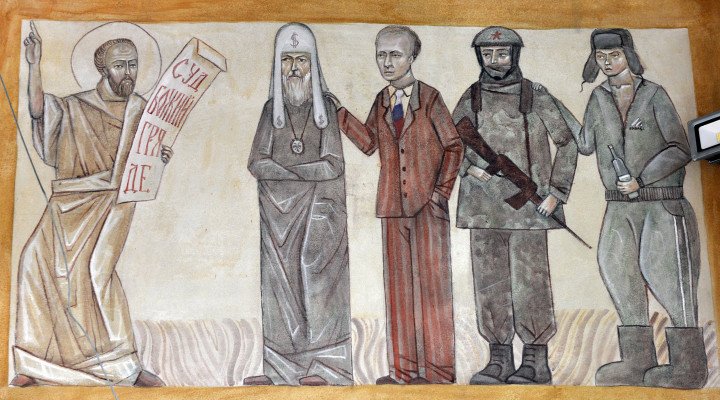
Netherlands
In Rotterdam, the Church of Alexander Nevsky is led by Priest Anatoly Babyuk who has declined to comment on Russia’s invasion of Ukraine. Its consecration in honor of Nevsky was led by Kirill. Within 3.6 km there are 2 military facilities, 1 maritime, and 1 power plant equipment supplier.
The Hague's Monastery of the Prophet, Forerunner, and Baptist John was established in 1972 but closed in December 2022. There were 29 government facilities nearby including the Federation of European Defense Technology Associations. It was founded as a male monastery under the jurisdiction of the Russian Church Abroad (ROCOR).
Czechia
In Prague, the state-owned Russian company Gazprom Neft partially financed the frescoes (paintings) of the Cathedral of Saints Cyril and Methodius. Archbishop Christopher of Prague awarded Dmitry Malyshev, an advisor to the Chairman of the Board of Gazprom Neft, for his assistance to the Church.
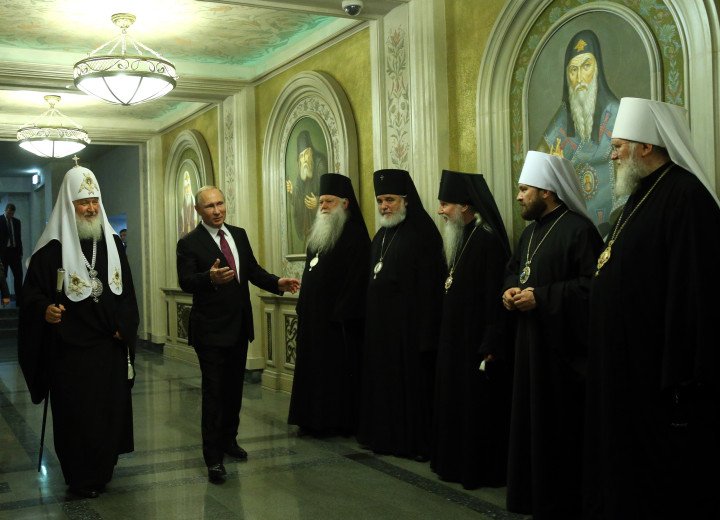
Estonia
Russian media reported that the head of the Estonian Orthodox Church, Valery Reshetnikov, would not have his citizenship renewed because the Russian national posed as "a security risk." Reshetnikov was accused of repeatedly justifying Russia's invasion of Ukraine and defending the Kremlin.
"His public actions and speaking support the aggressor and he has not changed his behavior despite warnings," said Indrek Aru, head of the Estonian northern prefecture's border guard office.
Molfar continues to investigate the strategic locations of the ROC across Europe and demands a serious response from European authorities.
“While Kirill attempts to justify imperial aggression, Ukrainians are demonstrating their own spiritual values through solidarity,” said Borys Gudziak President of the Ukrainian Catholic University in Lviv. “Despite the horrors of the Russian invasion, Ukrainians of all faiths and walks of life remain united. They are driven by a commitment to freedom that is the opposite of the intolerance preached by Kirill.”
-46f6afa2f66d31ff3df8ea1a8f5524ec.jpg)
-27ef304a0bfb28cb4215e5deede4a665.png)
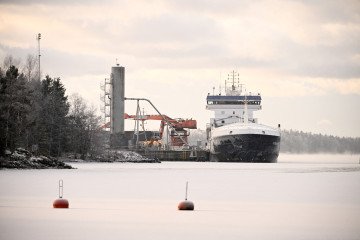
-605be766de04ba3d21b67fb76a76786a.jpg)
-2c683d1619a06f3b17d6ca7dd11ad5a1.jpg)

